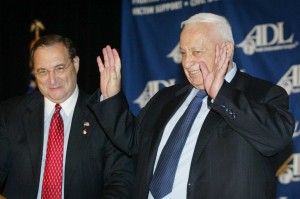JERUSALEM – I was privileged to know, appreciate, and befriend Ariel Sharon for both before and during the years he served as Israel’s 11th prime minister. He became, through the years, a dear friend. In today’s parlance, we were on each other’s “like list.” We frequently spoke on the phone. Whenever I visited Israel, or he visited the United States, we would make time to see each other.
Ariel Sharon (right) with Abraham H. Foxman at the Anti-Defamation League’s
2002 National Leadership Conference in Washington, D.C. Photo credit: ADL
While in Israel this week for Sharon’s funeral, I’ve thought a great deal about our relationship and his legacy.
At the time of his stroke eight years ago, Sharon was at the height of his powers. Not only had he been elected overwhelmingly a few years earlier as prime minister of Israel, but he had brought the U.S.-Israel relationship to unprecedented levels by securing a letter from President George W. Bush. In that historic letter, for the first time the United States indicated that it supported Israel holding on to some territory in the West Bank in any peace arrangement based on changes in history. And, the American president made clear that the Palestinian refugee problem must be resolved through the prospective new state of Palestine, not in Israel proper.
The context for this breakthrough was the controversial decision that Sharon made for Israel to withdraw unilaterally from the Gaza Strip. To this day, particularly because of the subsequent takeover of Gaza by Hamas, that decision has been the subject of much criticism. Whatever one’s views on Sharon’s initiative, and I believe that there is still much to be said for the decision, what must be regarded with esteem were the questions that Sharon posed which led to his decision.
I believe that the way he addressed this issue spoke volumes about Sharon’s whole life: his leadership abilities, his ability to think seriously and responsibly, his talent for looking at the bigger picture and breaking with past thinking if he deemed it necessary. And, of course, his love of Israel and the need to do what one has to do to ensure its future and security.
What Sharon saw in 2005, at the tail end of the Second Intifada, was first that Israel did not have a partner for peace. Former Palestinian leader Yasir Arafat had rejected the generous peace offers at Camp David and launched the brutal campaign of terrorism and suicide bombings. Israel under Sharon had managed to defeat this campaign, but it was clear that there was no Palestinian ready to make peace.
Historically, when Israel had no partner for peace, the response was: we must tough it out, remain strong, and wait for change on the other side. And Sharon had been a key Israeli, both on the military and political levels, to articulate this approach.
In this instance, however, he challenged that way of thinking because he understood that Israel faced a number of threats, not only the rejectionism and terrorism of the Palestinians. He understood that exactly because the Palestinians were not ready for peace, that Israel could not afford to stand still. Time was not working in Israel’s favor. The notion of a one-state solution between the Mediterranean and the Jordan was starting to gain traction. This would be a disaster for the whole enterprise of Jewish independence since taking in the Palestinian population of the West Bank and Gaza would make it impossible for Israel to remain both a Jewish and democratic state.
And he saw that international opinion was turning against Israel and while Israel believed that the absence of peace was strictly due to Palestinian hostility, the world was tired of the seemingly unending conflict and took the easy way out by blaming the “occupier.” Boycotts, isolation, one-state ideas seemed to be the wave of the future for the “occupier” of the territories.
And so Sharon chose to withdraw from Gaza, along the way securing the letter from President Bush.
I highlight Sharon’s thinking on this matter for two reasons: to illuminate what a remarkable leader he was despite some of the controversial actions he took earlier in his career. And to point out how much Israel misses him to this day with all the complexities that face the country.
Sharon’s low moment was the events surrounding Sabra and Shatilla during the first Lebanon War. He paid a price for his role, but he came back. And he came back as a more uniting figure. He was able to speak to both of the public’s fundamental demands: for peace AND security. There was great faith in his protecting the country as he did in defeating Palestinian terror. And at the same time, his thinking on Gaza reflected a creativity about Israel’s future and an approach which at the least could lead people to conclude that Israel was ready to act for peace even if the other side was not ready.
Sharon had moved from being a warrior to becoming a statesman. As was true in the case of the late Yitzhak Rabin, so too with Sharon – the changeover is overstated. In both capacities, Sharon was thinking and acting on behalf of his beloved Israel. Sometimes this meant strength and toughness. Other times it meant creative non-military decision-making.
Ariel Sharon’s legacy is a more secure State of Israel, safe on its borders and resolved to put an end to the campaign of Palestinian terrorism once and for all. It is not only Israel, but the Jewish people, the U.S., and the international community who have lost a towering figure who offered hope to his people and the region.
Abraham H. Foxman is National Director of the Anti-Defamation League.
[bestwebsoft_contact_form]







